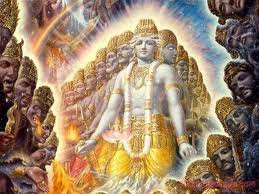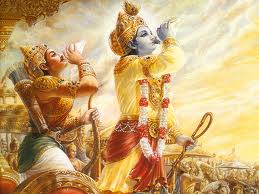Welcome to the second installment of our month-long series on “Purpose/Dharma/Destiny.” Today we’re talking about the two main characters of possibly the most famous piece of spiritual literature to rise out of India: the Bhagavad Gita.
Bhagavad Gita means “Song of the Lord.” Who is the Lord here? His name is Krishna, and he is one of many incarnations of Vishnu, the sustainer aspect of the tri-murti Godhead in Hindu thought and–many consider–the highest reality of God himself.

Our story takes place on the battlefield of Kurushetra, or the “field of dharma,” where our hero Lord Krishna serves as the chariot driver of Prince Arjuna. The battle is a war of succession. Arjuna and his family fights for his older brother, the rightful heir to the throne, against their evil cousins who stole the crown through greed and subterfuge. This isn’t a war between strangers, but family and friends.
“And Arjuna, standing between the two armies, saw fathers and grandfathers, teachers, uncles, and brothers, sons and grandsons, in-laws and friends. Seeing his kinsmen established in opposition, Arjuna was overcome by sorrow.” –Bhagavad Gita, Chapter 1, verses 26-28
Arjuna has just asked his chariot driver (a lowly position, by the way), Lord Krishna, to position himself between the two armies. He wants to see the reality of this war and is completely devastated by its implications. Arjuna goes on to describe his anguish, saying that he’d rather allow the enemy to kill him than strike a single blow.
Here is the difficulty: Prince Arjuna is not only part of the royal family, but a member of the warrior class. As Lord Krishna soon explains, Arjuna must fight.
“Considering your dharma [purpose/essence], you should not vacillate. For a warrior, nothing is higher than a war against evil. The warrior confronted with such a war should be pleased, Arjuna, for it comes as an open gate to heaven. But if you do not participate in this battle against evil, you will incur sin, violating your dharma and your honor.” –Lord Krishna from the Gita, Chapter 2, verses 31-33
Krishna tells Arjuna all of this after explaining the eternal nature of the Atman, the ultimate and immortal Self. He explains that we must detach ourselves from the fleeting nature of sensory objects and temporary feelings because they come and go. Even the body comes and goes, but the soul cannot be “burned or pierced.”
Now, standing between the two armies, Prince Arjuna is literally, spiritually, emotionally, and morally between a rock and a hard place.

This is where many believe the allegory and metaphor of the Bhagavad Gita come into play. Lord Krishna presents himself as a non-combatant. Although he is on Arjuna’s side (and has not yet revealed himself as God), he cannot fight on Arjuna’s behalf. Arjuna, like all of us, must face this life and its challenges on our own.
That isn’t to say that the divine is not with us. Lord Krishna shows us here that God is always there to support and guide us even through the most perilous episodes of our lives, but we cannot expect him to do for us what we ourselves are meant for. Arjuna then, represents all of us as we struggle with who we are, what we are meant for–our purpose. Lord Krishna represents the voice of insight, inspiration, divine guidance, our highest self or conscience.
There, in the midst of battle, Arjuna takes the time to fall at Krishna’s feet (which would seem odd considering Arjuna is of higher earthly status) and begs for Krishna’s guidance. Arjuna’s actions show us that wisdom and guidance are not always in the form we expect of them and that no matter what is happening around you, it is never folly to bring yourself to supplication and prayer/meditation/contemplation.
Now, like Moses from our first post, Prince Arjuna must face his destiny. This is why the battlefield in the story is called “the field of dharma.” The Bhagavad Gita is not a story which condones war. It is a story that illustrates the importance of doing the right thing, of conquering our own darkness, regardless of the cost or struggle. As in the case of Arjuna, we must first face and master ourselves before we can face the problems and evils of the world around us. God will be with us, but the divine cannot fight all of our battles for us

How are you struggling with your dharma (purpose/essence) today? Perhaps you’ve recently been involved in a situation where you were afraid to do the right thing because of social pressure. Perhaps you’re wrestling with a choice regarding what you want to do over what you should do. How can Arjuna and Krishna’s opening to the Bhagavad Gita help you face and overcome fears/worries/social pressures?
.

